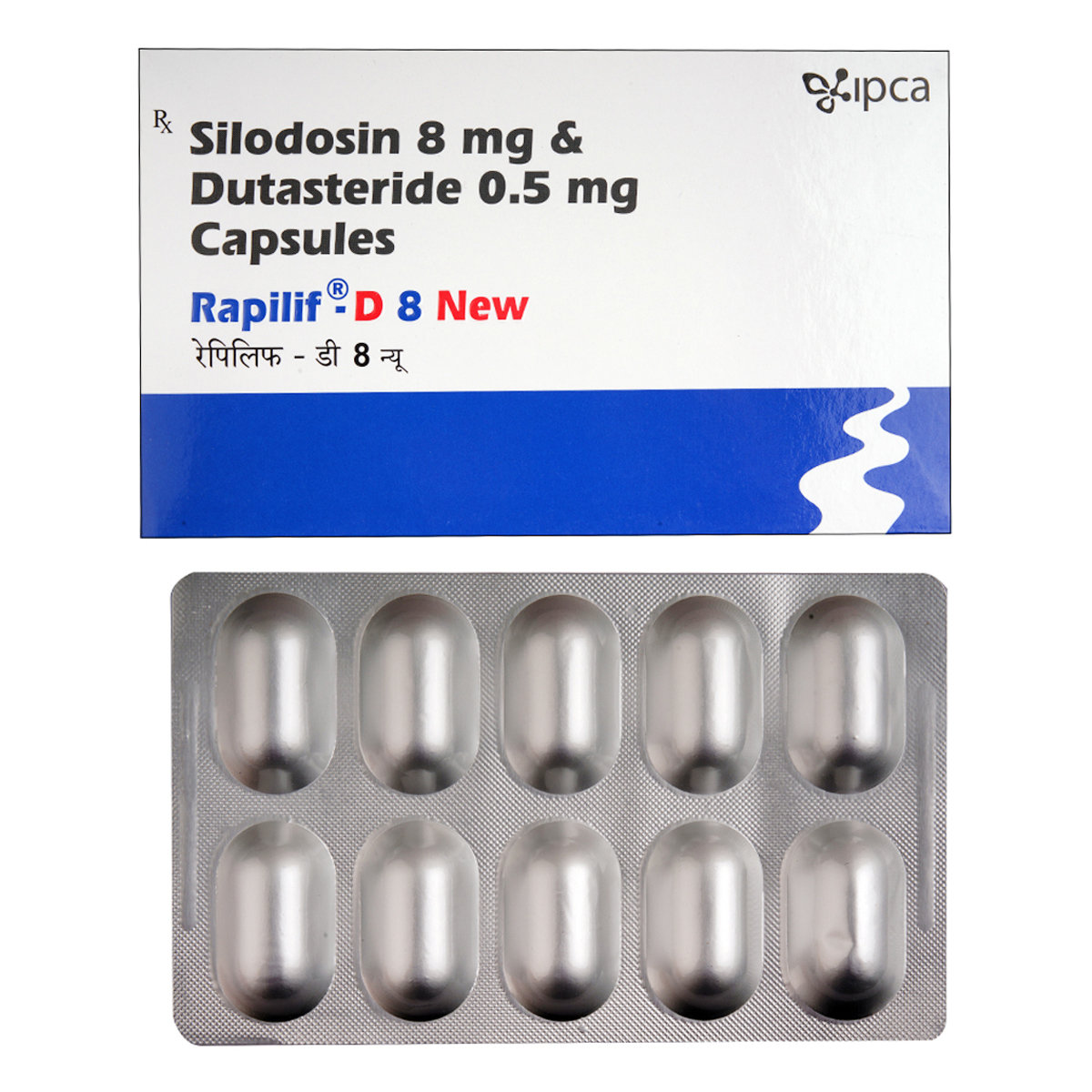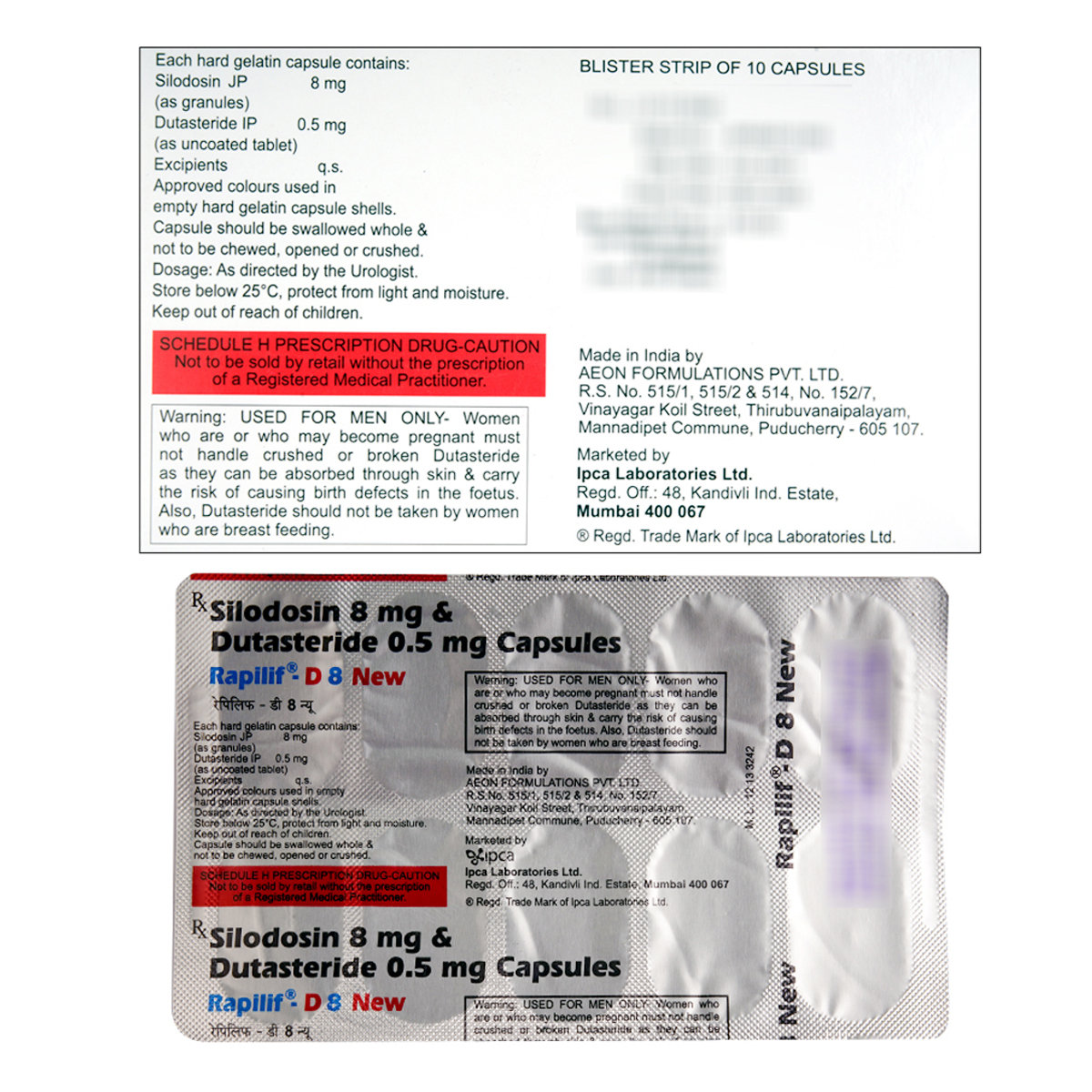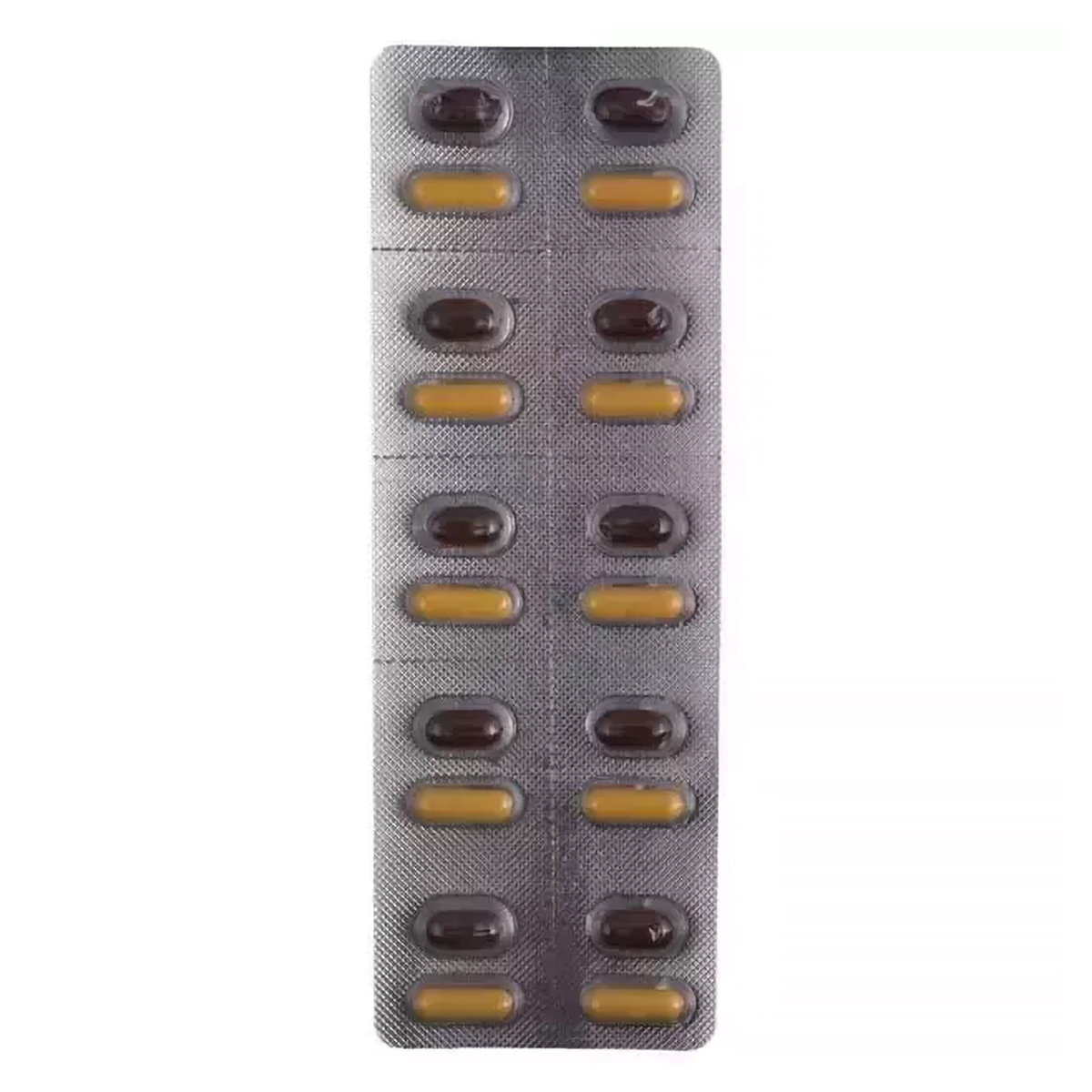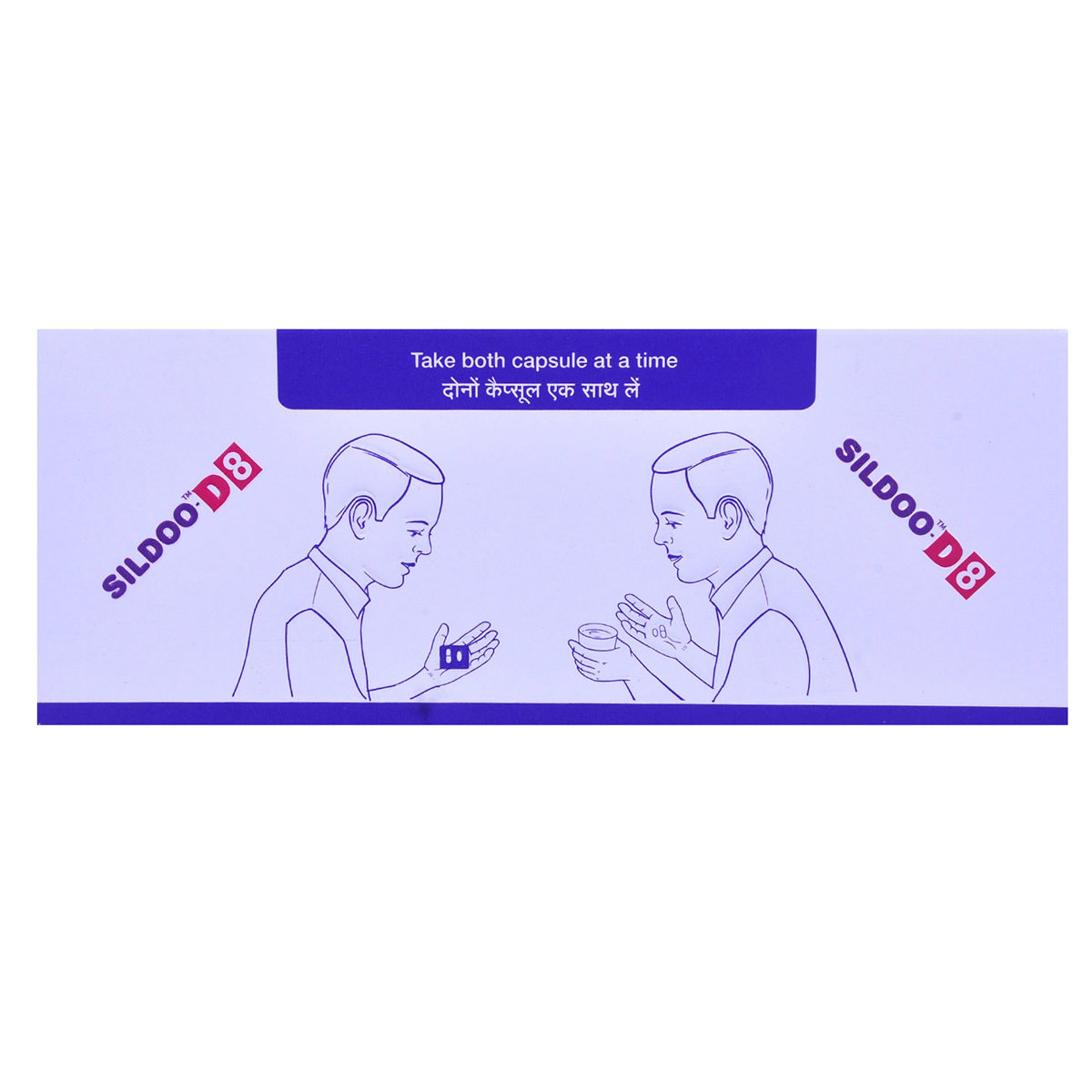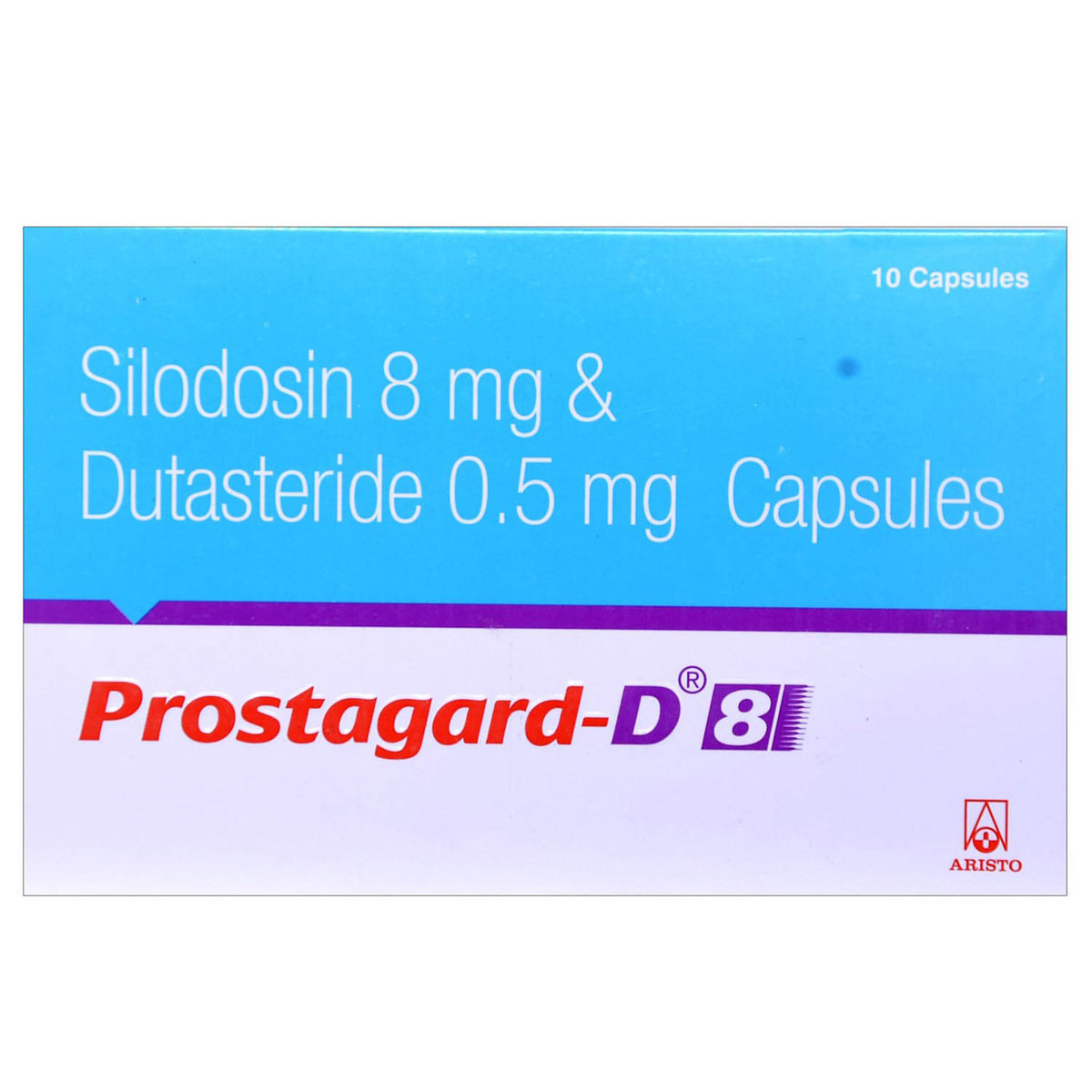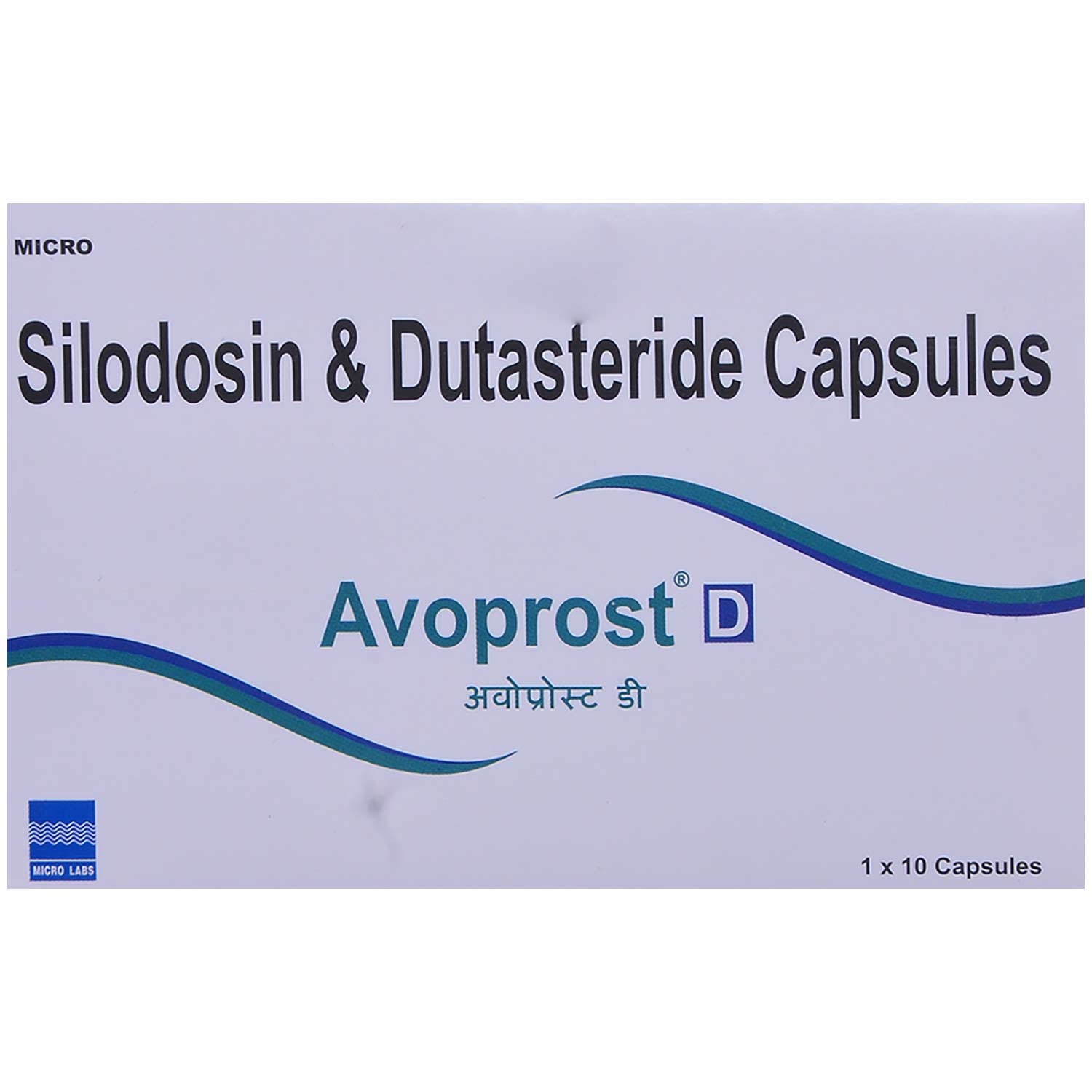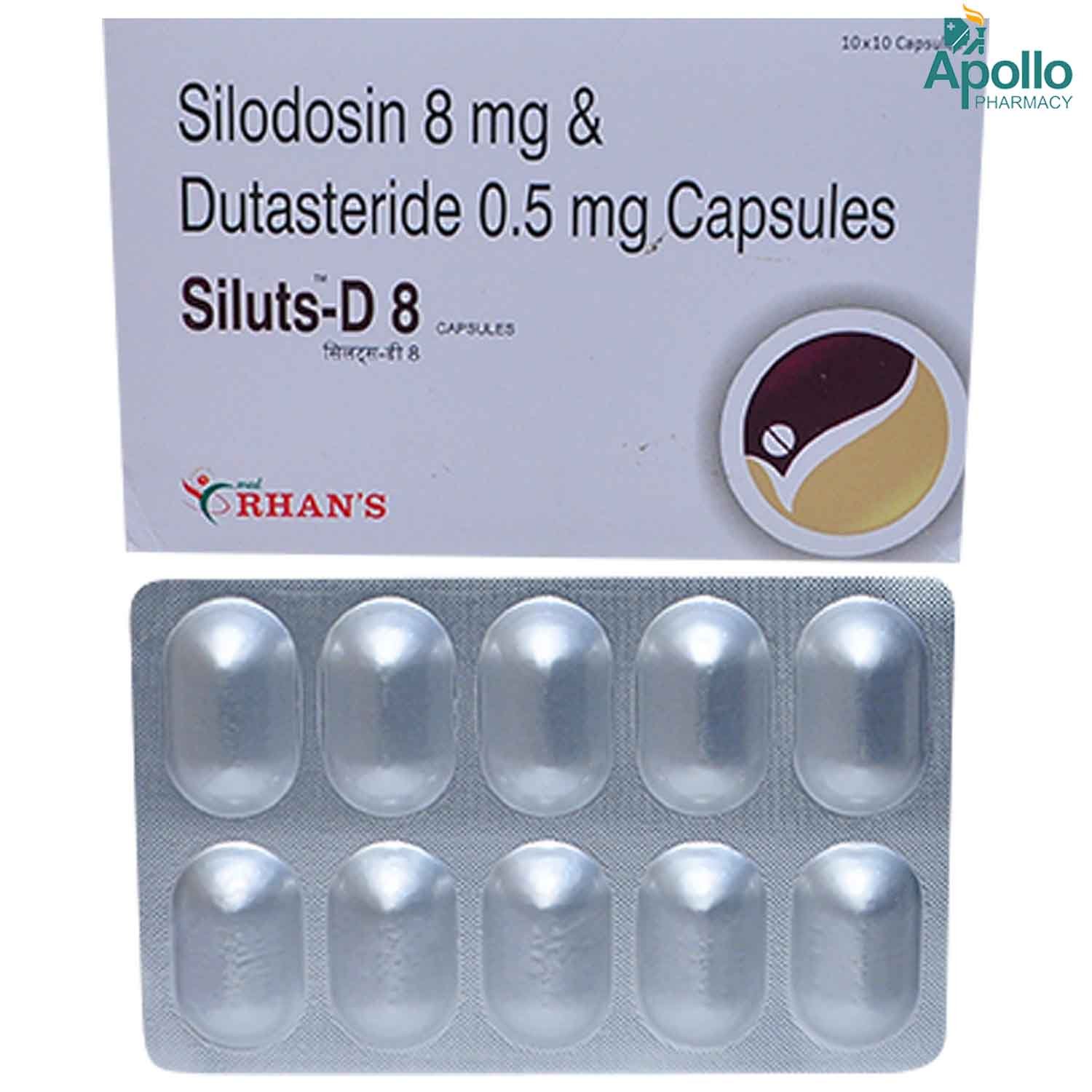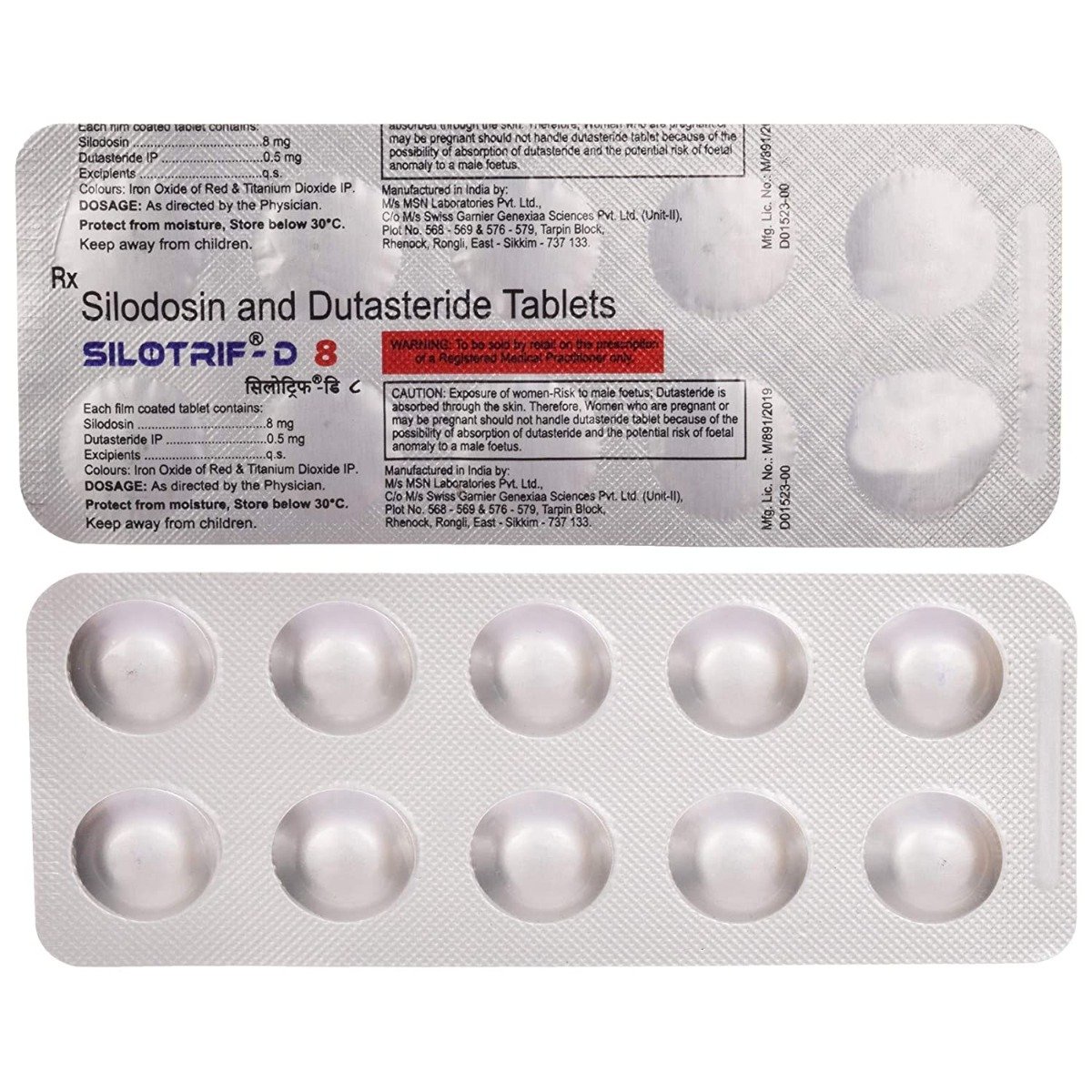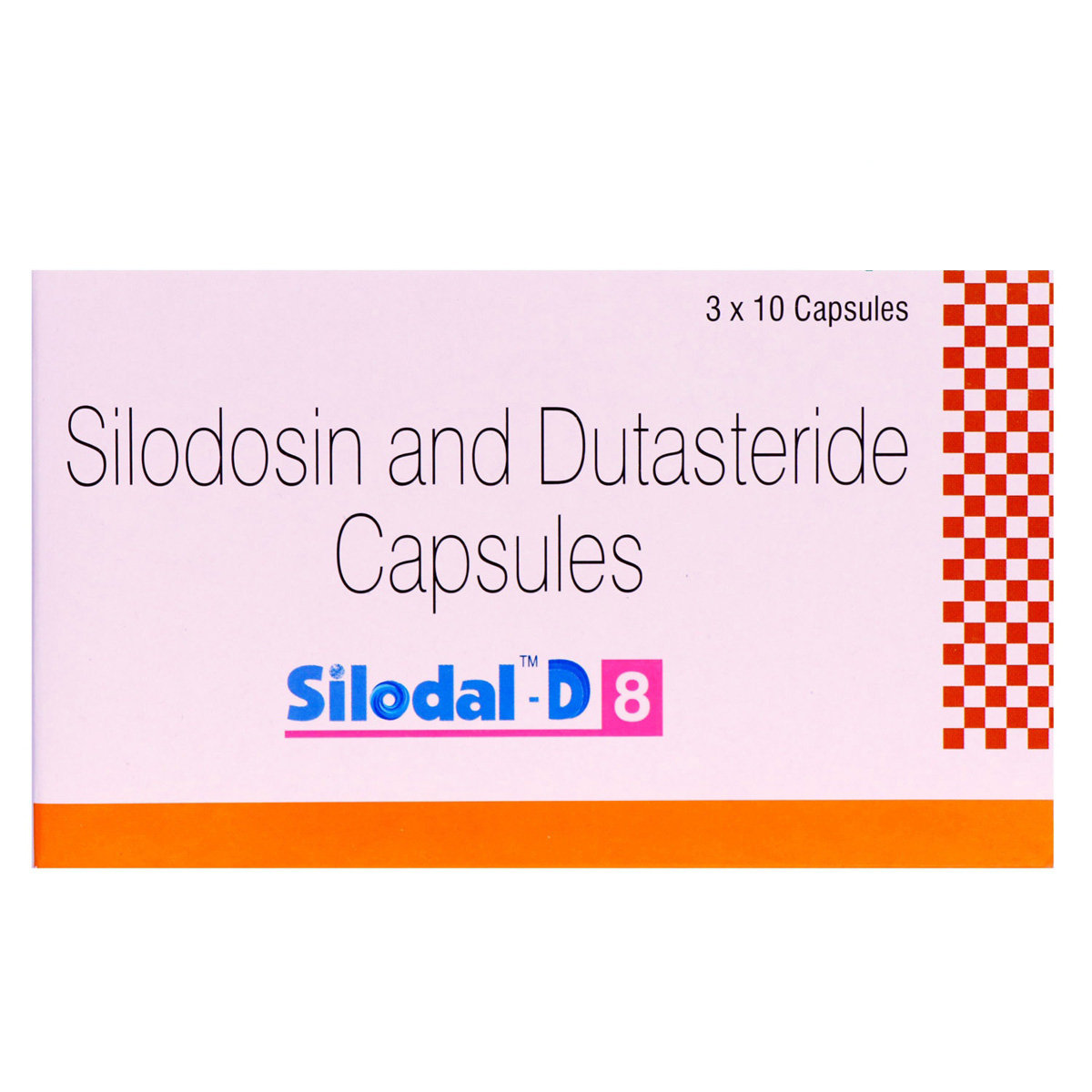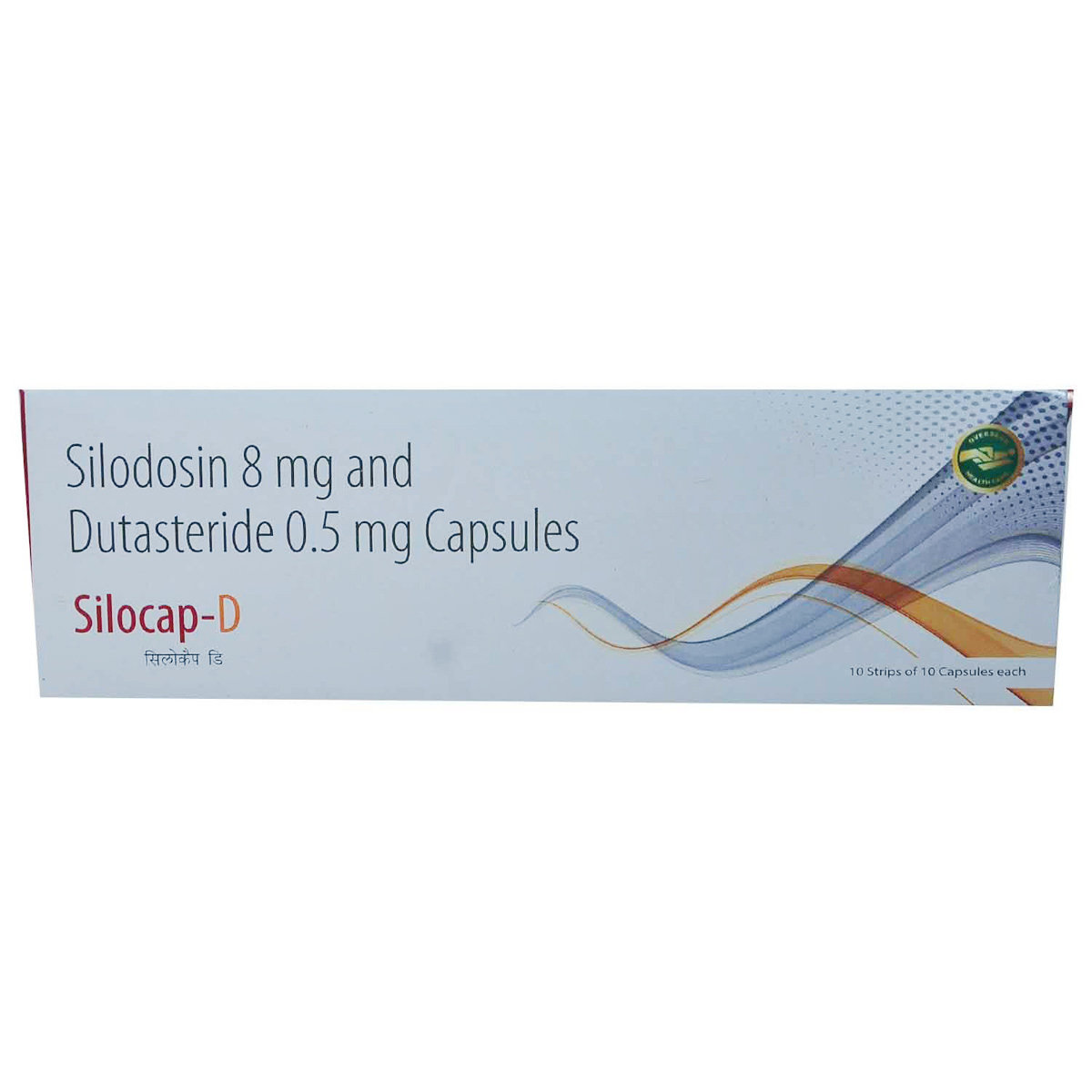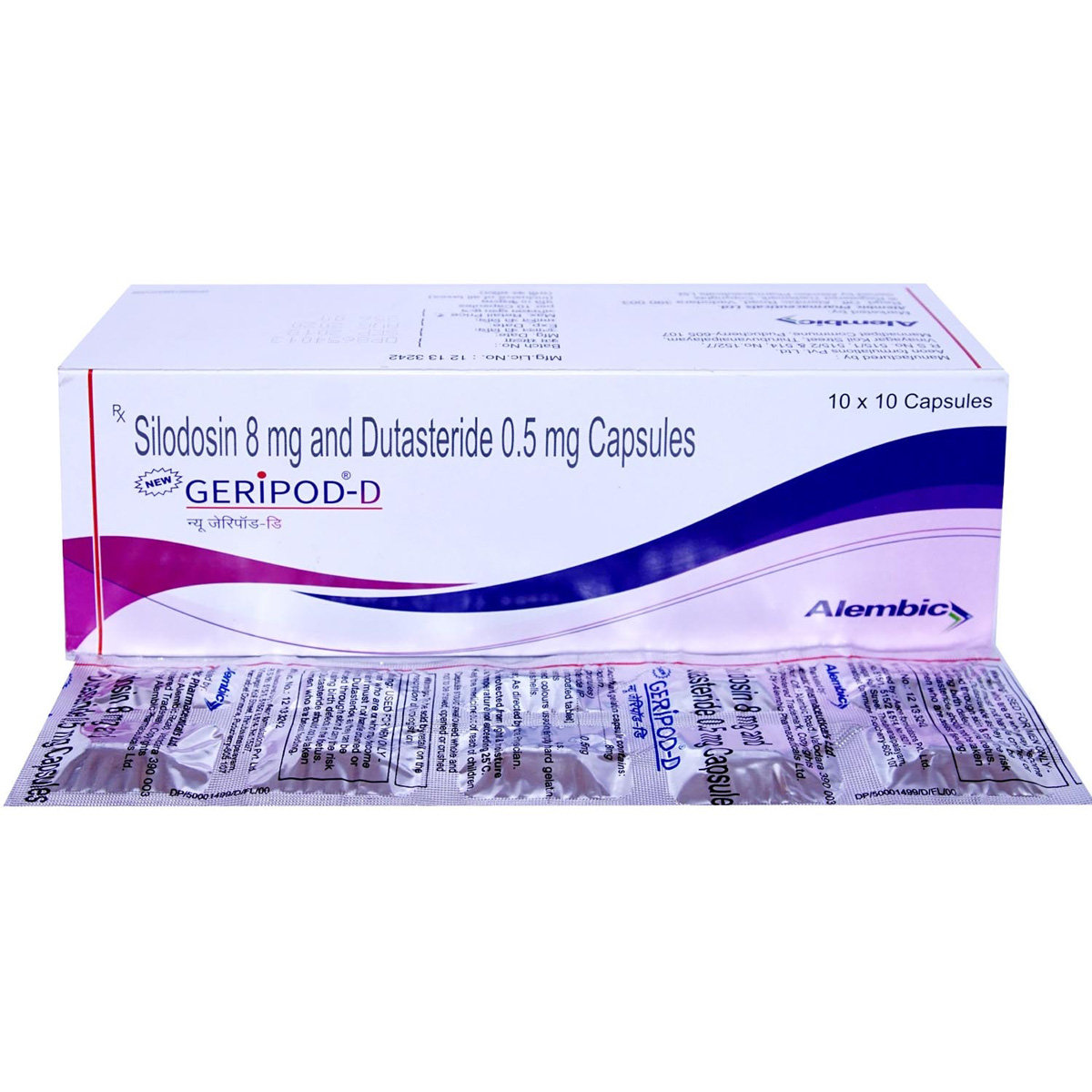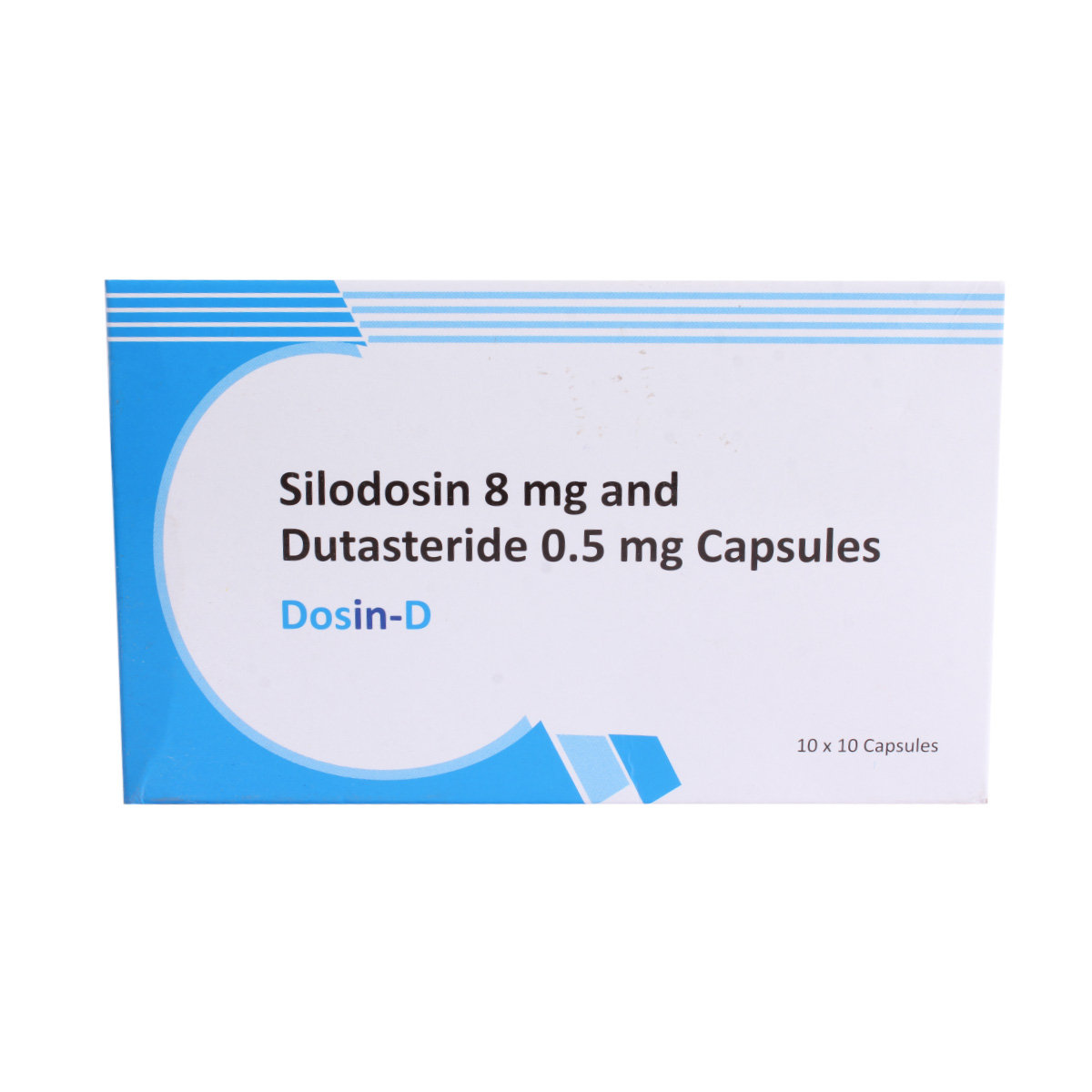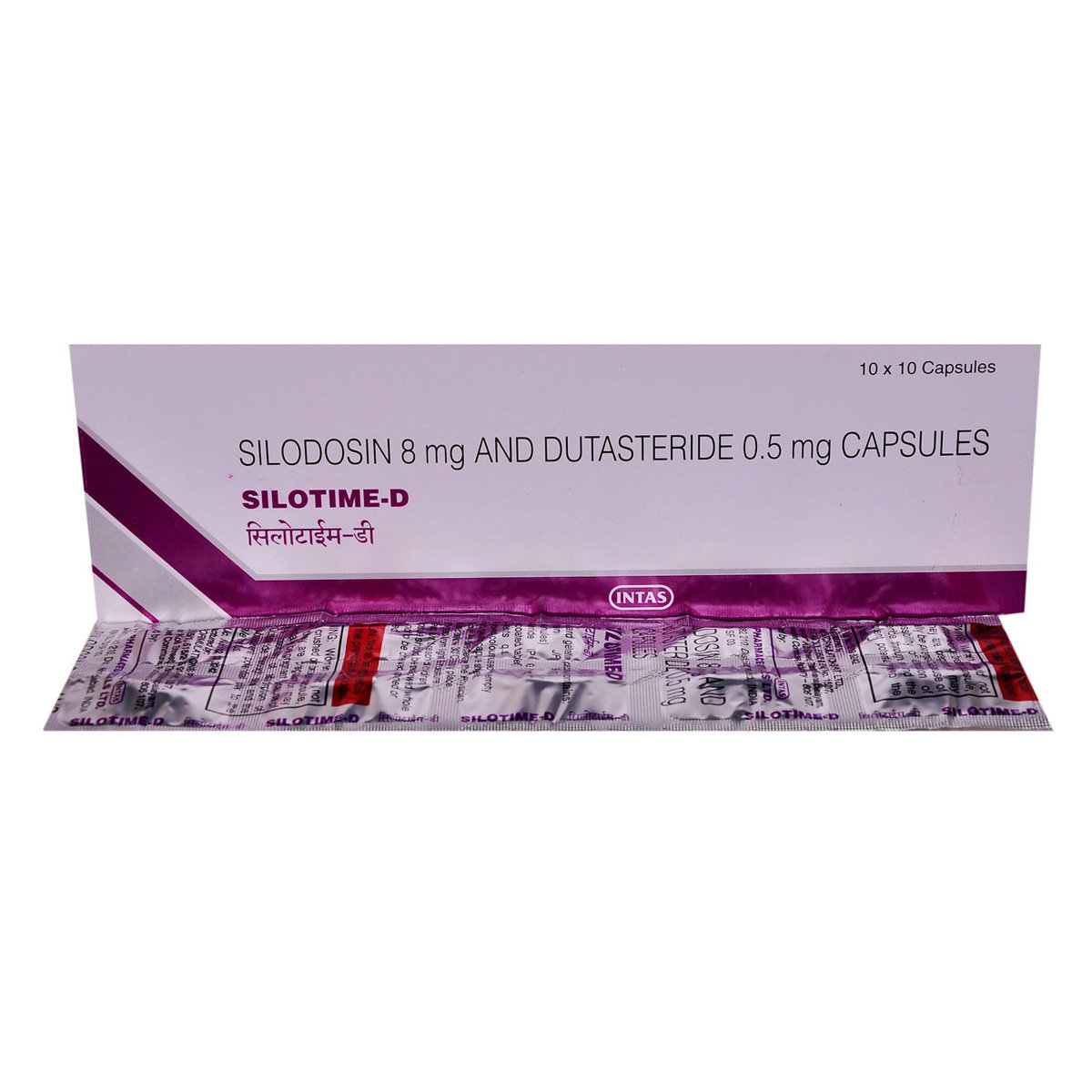Rapilif D 8 New Capsule 10's
MRP ₹440.5
(Inclusive of all Taxes)
₹66.1 Cashback (15%)
Provide Delivery Location
Online payment accepted
 Prescription drug
Prescription drugWhats That
Composition :
Manufacturer/Marketer :
Consume Type :
Expires on or after :
Return Policy :
About Rapilif D 8 New Capsule
Rapilif D 8 New Capsule is a combination of medicine primarily used to treat the symptoms of benign prostatic hyperplasia (BPH) in adults with an enlarged prostate gland. It helps to relieve symptoms such as difficulty urinating or urge to urinate more often and improve your ability to urinate. The prostate is a small, muscular gland in the male reproductive system. Enlargement of the prostate is called BPH common condition as men get older (50-60 years). It occurs when the cells of the prostate gland begin to multiply. In an enlarged prostate gland, the bladder wall becomes thicker, and the bladder may weaken and lose the ability to empty fully, leaving some urine in the bladder.
Rapilif D 8 New Capsule is a combination of two drugs, namely; Silodosin and Dutasteride. Silodosin belongs to a class of alpha-1 receptors (located in prostate and bladder) blocker that works by blocking the action of alpha-1 receptors and causes smooth muscle relaxation in the bladder and prostate. Dutasteride belongs to a class of 5-alpha reductase that works by blocking the action of a 5-alpha reductase enzyme, resulting in a shrink of the size of the prostate gland. Rapilif D 8 New Capsule reduces the BPH symptoms and improves your ability to urinate.
Take Rapilif D 8 New Capsule as prescribed. Your doctor will recommend how often you take Rapilif D 8 New Capsule based on your medical condition. In some cases, you may experience certain common side effects such as dizziness, headache, nasal congestion (stuffy nose), and diarrhoea. Most of these side effects do not require medical attention and will resolve gradually over time. However, you are advised to talk to your doctor if you experience these side effects persistently.
To treat your condition effectually continue taking Rapilif D 8 New Capsule for as long as your doctor has prescribed it. Try not to stop taking it on your own. Do not be reluctant to speak with your doctor if you experience any difficulty while taking Rapilif D 8 New Capsule . Avoid consumption of alcohol as it may increase the side effects like dizziness and low blood pressure. If you take Rapilif D 8 New Capsule with any antihypertensive medicine, your blood pressure could suddenly drop to s life-threatening level. So avoid intake of Rapilif D 8 New Capsule with antihypertensive drugs.
Uses of Rapilif D 8 New Capsule
Directions for Use
Key Benefits
Rapilif D 8 New Capsule is a combination of two drugs, namely; Silodosin and Dutasteride used to treat the symptoms of benign prostatic hyperplasia (BPH) in adults with an enlarged prostate gland. Silodosin belongs to a class of alpha-1 receptors (located in prostate and bladder) blocker that works by blocking the action of alpha-1 receptors and causes smooth muscle relaxation in the bladder and prostate. Dutasteride belongs to a class of 5-alpha reductase that works by blocking the action of a 5-alpha reductase enzyme, resulting in a shrink of the size of the prostate gland. Rapilif D 8 New Capsule reduces the BPH symptoms and improves your ability to urinate.
Storage
- Inform your doctor about the common cold symptoms you're experiencing due to medication.
- Your doctor may adjust your treatment plan, which could include changing your medication, adding new medications, or offering advice on managing your symptoms.
- Practice good hygiene, including frequent handwashing, avoiding close contact with others, and avoiding sharing utensils or personal items.
- Drink plenty of fluids, such as warm water or soup, to help thin out mucus.
- Get plenty of rest and engage in stress-reducing activities to help your body recover. If your symptoms don't subside or worsen, consult your doctor for further guidance.
- A blocked nose can be relieved by drinking more water, which helps clear fluids.
- Use saline nasal spray available over the counter to relieve blockage or blow harder to remove the mucus.
- Use nasal strips that can be placed on the nose to widen nostrils and increase airflow.
- Keep a humidifier around to moisten air at home/workplace.
- Consult your doctor if you experience symptoms of sinusitis, such as nasal congestion, facial pain, or headaches, which may be triggered by your medication.
- Your doctor may adjust your treatment plan by changing your medication, adding new medications, or providing guidance on managing your sinusitis symptoms.
- Practice good hygiene, including frequent handwashing, avoiding close contact with others, and avoiding sharing utensils or personal items.
- If your doctor advises, you can use nasal decongestants or saline nasal sprays to help relieve nasal congestion and sinus pressure.
- To help your body recover, get plenty of rest, stay hydrated, and engage in stress-reducing activities. If your symptoms persist or worsen, consult your doctor for further guidance.
- To help reduce symptoms, eat foods high in vitamin C, such as oranges, bell peppers and strawberries.
- Lightly blow your nose to remove mucus; steer clear of blowing hard.
- Infections can be prevented from spreading by washing hands frequently and staying away from other people.
- If you have allergies, do your best to avoid triggering allergens that could contribute to a runny nose.
- Don't smoke, as irritating the nasal passages can make a runny nose worse.
- Inform your doctor about dizziness symptoms. They may adjust your medication regimen or prescribe additional medications to manage symptoms.
- Follow your doctor's instructions for taking medication, and take it at the same time every day to minimize dizziness.
- When standing up, do so slowly and carefully to avoid sudden dizziness.
- Avoid making sudden movements, such as turning or bending quickly, which can exacerbate dizziness.
- Drink plenty of water throughout the day to stay hydrated and help alleviate dizziness symptoms.
- If you're feeling dizzy, sit or lie down and rest until the dizziness passes.
- Track when dizziness occurs and any factors that may trigger it, and share this information with your doctor to help manage symptoms.
Drug Warnings
Do not take Rapilif D 8 New Capsule if you are allergic to Rapilif D 8 New Capsule and ingredients in it. Consult your doctor before taking Rapilif D 8 New Capsule if you are taking medicines for the treatment of hypertension (high blood pressure). If you take Rapilif D 8 New Capsule with any antihypertensive medicine your blood pressure could suddenly drop to a life-threatening level. So avoid intake of Rapilif D 8 New Capsule with antihypertensive drugs. Do not take Rapilif D 8 New Capsule if you have/had a heart attack or stroke or heart failure, low blood pressure, kidney or liver disease, have certain eye diseases, loss of vision due to loss of blood flow to the optic (eye) nerve. You are advised not to drive or operate heavy machinery after taking Rapilif D 8 New Capsule as it may cause dizziness. Avoid consuming alcohol along with Rapilif D 8 New Capsule as it could lead to increased dizziness and drowsiness. Older patients may be more sensitive to the side effects of Rapilif D 8 New Capsule , especially dizziness and low blood pressure when getting up from a sitting or lying position. Rapilif D 8 New Capsule should not be given to women and children less than 18 years of age.
Drug-Drug Interactions
Drug-Drug Interactions
Login/Sign Up
Co-administration of Atazanavir and Rapilif D 8 New Capsule together can increase the effectiveness of Rapilif D 8 New Capsule which may lead to side effects including extremely low blood pressure, increased heart rate.
How to manage the interaction:
Taking Atazanavir and Rapilif D 8 New Capsule together is not recommended as it can result in an interaction, but it can be taken if a doctor has advised it. However, if you experience any symptoms such as dizziness, lightheadedness, fainting, headache, flushing, nasal congestion, or heart palpitation, consult a doctor immediately. Do not discontinue any medications without consulting a doctor.
Co-administration of Telithromycin and Rapilif D 8 New Capsule together can increase the effect of Rapilif D 8 New Capsule which may lead to side effects like extremely low blood pressure and increased heart rate.
How to manage the interaction:
Taking Telithromycin and Rapilif D 8 New Capsule together is not recommended, but it can be taken if prescribed by a doctor. If you notice any of these signs like dizziness, lightheadedness, fainting, headache, flushing, nasal congestion, heart palpitation, call a doctor right away. Do not stop using any medications without a doctor's advice.
Coadministration of Rapilif D 8 New Capsule and posaconazole may significantly increase the blood levels and effects of Rapilif D 8 New Capsule.
How to manage the interaction:
Although there is an interaction between Posaconazole and Rapilif D 8 New Capsule, they can be taken together if prescribed by a doctor. However, consult a doctor if you experience sudden dizziness, lightheadedness, fainting, nasal congestion, and headache. Do not discontinue any medications without consulting a doctor.
Co-administration of Delavirdine and Rapilif D 8 New Capsule together can increase the effect of Rapilif D 8 New Capsule which may lead to side effects including extremely low blood pressure, increased heart rate.
How to manage the interaction:
Taking Rapilif D 8 New Capsule with Delavirdine together is not recommended as it can possibly result in an interaction, but it can be taken if a doctor has advised it. However, consult a doctor immediately if you experience any symptoms such as dizziness, lightheadedness, fainting, headache, flushing, nasal congestion, or heart palpitation. Do not discontinue any medications without consulting a doctor.
Co-administration of Ceritinib and Rapilif D 8 New Capsule together can increase the effect of Rapilif D 8 New Capsule and increase the risk for side effects.
How to manage the interaction:
Taking Rapilif D 8 New Capsule and Ceritinib together is not recommended as it can possibly result in an interaction, but it can be taken if a doctor has advised it. However, consult a doctor immediately if you experience any symptoms such as dizziness, lightheadedness, fainting, headache, flushing, nasal congestion, or heart palpitation. Do not discontinue any medications without consulting a doctor.
Taking Rapilif D 8 New Capsule with Clarithromycin may significantly increase the blood levels and effects of Rapilif D 8 New Capsule, this may cause blood pressure to fall excessively and heart rate to increase, especially when you rise from a sitting or lying position.
How to manage the interaction:
Co-administration of Clarithromycin and Rapilif D 8 New Capsule is not recommended as it can lead to an interaction, but it can be taken if advised by a doctor. However, consult a doctor immediately if you experience any symptoms like dizziness, lightheadedness, fainting, headache, flushing, nasal congestion, or heart palpitation. Do not stop using any medications without a doctor's advice.
Co-administration of Cobicistat and Rapilif D 8 New Capsule together can increase the effect of Rapilif D 8 New Capsule which may lead to side effects including extremely low blood pressure, increased heart rate.
How to manage the interaction:
Taking Cobicistat with Rapilif D 8 New Capsule together is not recommended as it can possibly result in an interaction, but it can be taken if a doctor has advised it. However, consult a doctor immediately if you experience any symptoms such as dizziness, lightheadedness, fainting, headache, flushing, nasal congestion, or heart palpitation. Do not discontinue any medications without consulting a doctor.
Co-administration of Fosamprenavir and Rapilif D 8 New Capsule together can increase the effect of Rapilif D 8 New Capsule which may lead to side effects including extremely low blood pressure, increased heart rate.
How to manage the interaction:
Taking Fosamprenavir with Rapilif D 8 New Capsule together i not recommended as it can possibly result in an interaction, but it can be taken if a doctor has advised it. However, consult a doctor immediately if you experience any symptoms such as dizziness, lightheadedness, fainting, headache, flushing, nasal congestion, or heart palpitation. Do not discontinue any medications without consulting a doctor.
Co-administration of Amprenavir and Rapilif D 8 New Capsule together can increase the effect of Rapilif D 8 New Capsule which may lead to extremely low blood pressure, increased heart rate and other side effects.
How to manage the interaction:
Taking Amprenavir and Rapilif D 8 New Capsule together is avoided, but it can be taken if your doctor has advised it. However, consult a doctor immediately if you experience any symptoms such as dizziness, lightheadedness, fainting, headache, flushing, nasal congestion, or heart palpitation. Do not discontinue any medications without consulting a doctor.
Co-administration of Rapilif D 8 New Capsule together with Voriconazole, may significantly increase the blood levels and effects of Rapilif D 8 New Capsule which may lead to side effects.
How to manage the interaction:
Taking Voriconazole and Rapilif D 8 New Capsule is not recommended, but it can be taken if prescribed by a doctor. If you experience dizziness, headache, heart palpitation-call a doctor right away. Do not stop using any medications without a doctor's advice.
Drug-Food Interactions
Drug-Food Interactions
Login/Sign Up
Diet & Lifestyle Advise
- Maintaining a healthy weight, eating a balanced diet, and regular exercising may help your bladder empty at a normal rate.
- Avoid consumption of alcohol to treat your condition effectively as consuming an excessive amount of alcohol may make you pee more and can irritate your bladder.
- Limit the amount of fluids and caffeine you drink, especially before you go out or go to bed.
- Stay warm, cold can make it feel more urgent to pee.
- Avoid usage of tobacco.
- Do daily exercise to strengthen your pelvic floor muscles.
Side Effects of Rapilif D 8 New Capsule
- Headache
- Dizziness
- Nasal congestion (stuffy nose)
- Diarrhoea
- Ejaculation disorder
- Retrograde ejaculation
- Impotence
- Orthostatic hypotension (sudden lowering of blood pressure on standing)
Habit Forming
Therapeutic Class
All Substitutes & Brand Comparisons
RX
Rapilif-D 8/0.5 Capsule Combipack
Ipca Laboratories Ltd
₹440.5
(₹19.83 per unit)
49% CHEAPERRX
Sildoo-D8 Capsule Combipack
Dr Reddy's Laboratories Ltd
₹452.5
(₹20.37 per unit)
48% CHEAPERRX
Prostagard-D 8 Capsule 10's
Aristo Pharmaceuticals Pvt Ltd
₹241
(₹21.69 per unit)
45% CHEAPER
Author Details
We provide you with authentic, trustworthy and relevant information
Drug-Diseases Interactions
Drug-Diseases Interactions
Login/Sign Up
FAQs
Drug-Drug Interactions Checker List
- PRAZOSIN
- TERAZOSIN
- SILDENAFIL
- TADALAFIL
- ITRACONAZOLE
- KETOCONAZOLE
- LOPINAVIR
- RITONAVIR
Special Advise
- Regularly monitor blood pressure is required while taking Rapilif D 8 New Capsule .
Disease/Condition Glossary
Benign Prostatic Hyperplasia (BPH): is an enlargement of the prostate gland. The prostate is a small, muscular gland in the male reproductive system. It is a common condition as men get older (50-60 years). It occurs when the cells of the prostate gland begin to multiply. In an enlarged prostate gland, the bladder wall becomes thicker, and the bladder may weaken and lose the ability to empty fully, leaving some urine in the bladder. Symptoms of BPH include frequent or urgent need to urinate, nocturia (increased frequency of urination at night, difficulty starting urination, inability to empty the bladder, painful urination, blood in the urine.

Have a query?
Alcohol
Safe if prescribed
You are advised not to consume alcohol while taking Rapilif D 8 New Capsule as it makes you pee more and can irritate your bladder and also increased dizziness and lower blood pressure.
Pregnancy
Consult your doctor
Women should not use Rapilif D 8 New Capsule as it is used to treat benign prostatic hyperplasia (BPH) in men only.
Breast Feeding
Consult your doctor
Women should not use Rapilif D 8 New Capsule as it is used to treat benign prostatic hyperplasia (BPH) in men only.
Driving
Safe if prescribed
Rapilif D 8 New Capsule may cause dizziness. Therefore you are advised to drive and operate machinery only if you are alert.
Liver
Consult your doctor
Rapilif D 8 New Capsule should be used with caution in patients with liver disease. The dose adjustment may be needed in such patients.
Kidney
Consult your doctor
Rapilif D 8 New Capsule should be used with caution in patients with kidney disease. The dose adjustment may be needed in such patients.
Children
Safe if prescribed
Rapilif D 8 New Capsule is not recommended for children below 18 years of age.
Recommended for a 30-day course: 3 Strips

